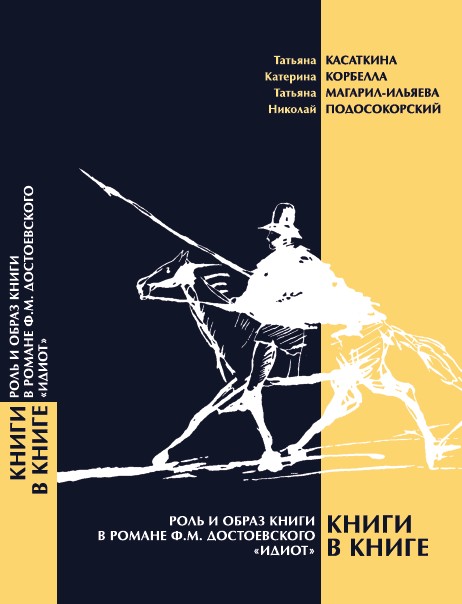Information about the authors:
Tatyana A. Kasatkina
Tatiana A. Kasatkina, DSc in Philology, Director of Research, Head of the Research Centre “Dostoevsky and World Culture”, A.M. Gorky Institute of World Literature of the Russian Academy of Sciences, Povarskaya 25A, bld. 1, 121069 Moscow, Russia.
https://orcid.org/0000-0002-0875-067X
E-mail:
Caterina Corbella
Caterina Corbella, Associate Researcher, Research Centre “Dostoevsky and World Culture”, A.M. Gorky Institute of World Literature of the Russian Academy of Sciences, Povarskaya 25 a, 121069 Moscow, Russia.
ORCID ID: https://orcid.org/0000-0001-5996-0127
E-mail:
Tatiana G. Magaril-Il’iaeva
Tatiana G. Magaril-Il’iaeva, PhD in Philology, Senior Researcher, Research Centre “Dostoevsky and World Culture,” А.M. Gorky Institute of World Literature of the Russian Academy of Sciences, Povarskaya St., 25A, bld. 1, 121069 Moscow, Russia
ORCID ID: https://orcid.org/0000-0001-7521-1898
E-mail:
Nikolay N. Podosokorsky
Nikolay N. Podosokorsky, PhD in Philology, Senior Researcher, Research Centre “Dostoevsky and World Culture,” A.M. Gorky Institute of World Literature of the Russian Academy of Sciences, Povarskaya St., 25 A, bld. 1, 121069 Moscow, Russia.
ORCID ID: https://orcid.org/0000-0001-6310-1579
E-mail:
The study was conducted at the Gorky Institute of World Literature of the Russian Academy of Sciences with the grant support from the Russian Science Foundation (RSF, project number 23-28-00258)
The present edition was financially supported by the Russian Science Foundation under Project no. 23-28-00258 and it is not for sale
Abstract: The most characteristic feature of Fyodor Dostoevsky’s artistic world is that virtually all the major characters in his works read, discuss, translate, interpret and analyze, buy and sell, give, borrow and lend to each other, and write various books themselves. At the same time, the mention of a book in Dostoevsky’s texts is never accidental or random, but inevitably introduces an additional dimension to the main stories, which can thus expand and deepen in an extraordinary way, incorporating the complexly interpreted meanings of the book that was mentioned, as well as its genre form, ranging from the everyday and historical anecdote, the feuilleton, the magazine and newspaper article, to the evangelical parable and the apocalyptic prophecy. However, even against the background of Dostoevsky’s oeuvre, the novel The Idiot stands out in terms of the number of books it contains. The collective monograph offered to our readers is devoted to exploring the reasons and purposes, the modes and nature of the presence of such an abundance of artistic, historical and sacred books in the writer’s most mystical novel, demonstrating how the books included in it influence its poetics, ethics, aesthetics and metaphysics. For readers who love Dostoevsky, as well as for philologists, philosophers, and theologians.
Keywords: Dostoevsky, The Idiot, book as a text, book as an object, the functions of quoting or mentioning, Apocalypses, Don Quixote, Krylov, Annenkov edition of Pushkin’s collected work, The Lady of the Camellias, Madame Bovary, History of the Russian State by Karamzin, Russian History by Solovyov, World History by Schlosser, The History of the Campaign of 1815. Waterloo by Charras.



